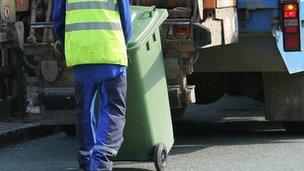Cosla commission to examine future of local government
- Published

The commission will look at how local services might evolve in the future
A detailed inquiry is to be carried out into the future of councils and local services in Scotland.
Cosla has announced details of a commission which will examine how councils and local services might evolve.
Its remit is to examine ways of strengthening local democracy across the country, regardless of the result of the independence referendum.
Members will include councillors, academics and journalists.
Cosla hopes it will result in a blueprint for how local government might evolve in the discussions about the future of Scotland after the referendum - whether that means the shaping of an independent country's constitution, devising a "devo max" settlement or simply improving existing arrangements.
The local government organisation's president, David O'Neill, said: "The bottom line is that local matters and it is valued within our communities. Making Scotland a fairer, healthier and wealthier place will not be achieved from the top down - we know that trying to do so simply does not work."
Transfer of power
He added: "The reality is that empowering lives in our communities means empowering local democracy and letting local people decide on their priorities, their services and their spending."
As well as Mr O'Neill, the commission has 20 other members. They include councillors from across Scotland, representatives of voluntary groups, STUC general secretary Graham Smith, the academic Prof Richard Kerley and the editor of the Daily Record newspaper Alan Rennie.
Some in local government fear that since devolution in 1999 there has been a trend towards the "creep centralisation" of services in Scotland.
They would argue that unrelated measures such as the terms of the council tax freeze and the creation of national police and fire services have, when taken together, weakened local accountability.
Some councillors argue devolution did not just mean a transfer of power from Westminster to Holyrood but from town halls to the Scottish government.
Mr O'Neill is keen to see a form of "constitutional protection" for local government in Scotland after the independence question is settled.
He believes central government and local government should have guaranteed responsibilities - at the moment councils could, in theory at least, be abolished by Holyrood.
Mr O'Neill describes the need for "spheres of influence - not tiers of influence". In other words, he would want a formal mechanism to ensure that central government recognised the responsibility of councils to make certain decisions or provide local services."
Council tax
He said: "Over the decades we have moved away from the local aspect of almost everything. More and more services are being run by distant bureaucracies and often these services are being done to people rather than delivered with them.
"Yet, across Europe the opposite is often true. That trend simply won't see us through for much longer because it is no coincidence that our European neighbours are often more successful at improving outcomes."
One question might concern the details of local government finance. At present around 80p of every pound each council spends comes directly from the Scottish government.
Most of the rest comes from the council tax but the terms of the council tax freeze - due to last until 2016 - make it difficult to raise extra money to a significant level.
Because of this, many councils feel their hands are tied when it comes to money. Some would like to have more financial flexibility to minimise the need for continuing austerity and hard decisions on local spending. This could mean, for instance, greater flexibility over business rates.
Another question might be whether all councils should have the same set of powers - or if they should vary depending on local circumstances.
The three island authorities are currently arguing for additional powers while the councils responsible for Scotland's cities are examining the case for extra economic powers and responsibilities.
Gather evidence
The commission might also look at ways of "devolving" power from councils to local communities.
But it is unlikely to make recommendations about redrawing the map of Scotland's 32 councils while decisions to share local services - either by pooling them with neighbouring authorities or other public services - are likely to be left to individual councils.
The commission intends to try to gather evidence from all across Scotland.
But one challenge might simply be engaging the broader public in the debate. Just 38% of voters took part in last year's council elections.
Another might be the extent to which it is possible to devolve real power to communities. Community councils have no formal legal responsibilities but exist to feed into local authority decision making.
Supporters say they can make a real difference to the people they serve but in many parts of the country, community councils are lying moribund through apparent lack of interest.
The commission's report is expected in the spring.
In the event of Scots rejecting independence, it would be largely be up to the Scottish government to decide whether to put any of the commission's recommendations into practice.
However it is possible the commission may also urge some council control over the practicalities of welfare delivery and other services which Westminster is responsible for.
In the event of a no vote, Cosla might hope to convince Westminster that any move to give Scotland more power did not automatically mean transferring more power to the Scottish Parliament.
Were there to be a vote in favour of independence, the report might play a part in the debate over what an independent Scotland would actually be like.